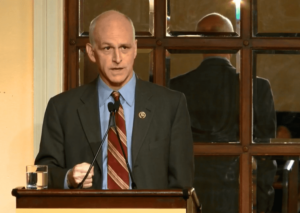The chairman of the House Armed Services Committee (HASC) is urging lawmakers to retain the base renaming directive in the next National Defense Authorization Act (NDAA), while adding Republicans are not likely to agree on sending a bill that the president would veto.
Rep. Adam Smith (D-Wash.) on Thursday evening addressed reports that the White House floated the possibility of dropping its opposition to the base renaming if the NDAA includes a provision stripping a social media-related regulation, saying its highly unlikely that the deal will be seriously considered.

“The president is not going to veto the defense bill. And I can say that with almost absolute certainty. And the reason is because [Senate Majority Leader] Mitch McConnell (R-Ky.) and [Sen.] Jim Inhofe (R-Okla.) are not going to send him a bill that he says he’s going to veto,” Smith said during a Council on Foreign Relations discussion. “They’re not going to do anything he doesn’t want them to do.”
Congress is beginning to kick off its formal process for settling differences between the House and Senate versions of the FY ‘21 NDAA, with Smith previously saying he is aiming to deliver a final bill by the first week in December.
Rep. Mac Thornberry (R-Texas), the HASC ranking member, earlier this week said he believes the looming runoff elections in Georgia to decide control of the Senate in the next Congress and the ongoing debate over base renaming could ultimately delay passage of the final NDAA (Defense Daily, Nov. 17).
The White House has previously said it will likely veto the NDAA if it includes a directive to rename bases named after Confederate leaders, with Inhofe backing the administration’s call to remove the provision.
Smith said Mark Meadows, the White House chief of staff, suggested a deal could be made if the NDAA includes a repeal of Section 230, a regulation that provides social media companies immunity from the content on their platforms.
“The president’s motivation is transparent. He thinks social media was mean to him,” Smith said. “Yeah, I don’t think that’s the way out of this. But look, it’s really simple, there’s no reason not to change these base names. There’s a commission set up in the Senate language. It’s not required to be done immediately. It’s what we ought to agree to, and we’re talking about it.”
Both versions of the bill contain base renaming provisions, while the House’s version requires installations to be renamed within a year of the bill’s passage and the Senate requires a change within three years.
“We have bases named in this country for Confederate generals, and those bases weren’t even named in the immediate aftermath of the Civil War. They were named in the Jim Crow era. And they were named as a celebration of white supremacy,” Smith said. “It’s offensive, why we would ever name anything after people who rose up in armed rebellion against our country. And it should be changed.”